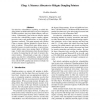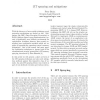10 search results - page 2 / 2 » Preventing Overflow Attacks by Memory Randomization |
USS
2010
13 years 2 months ago
2010
Use-after-free vulnerabilities exploiting so-called dangling pointers to deallocated objects are just as dangerous as buffer overflows: they may enable arbitrary code execution. U...
SRDS
2003
IEEE
13 years 9 months ago
2003
IEEE
A large class of security attacks exploit software implementation vulnerabilities such as unchecked buffers. This paper proposes Transparent Runtime Randomization (TRR), a general...
CORR
2010
Springer
13 years 4 months ago
2010
Springer
With the discovery of new exploit techniques, novel protection mechanisms are needed as well. Mitigations like DEP (Data Execution Prevention) or ASLR (Address Space Layout Random...
ACSAC
2006
IEEE
13 years 10 months ago
2006
IEEE
Address space randomization is an emerging and promising method for stopping a broad range of memory corruption attacks. By randomly shifting critical memory regions at process in...
PERVASIVE
2009
Springer
13 years 11 months ago
2009
Springer
Cloning of RFID tags can lead to financial losses in many commercial RFID applications. There are two general strategies to provide security: prevention and detection. The securit...


